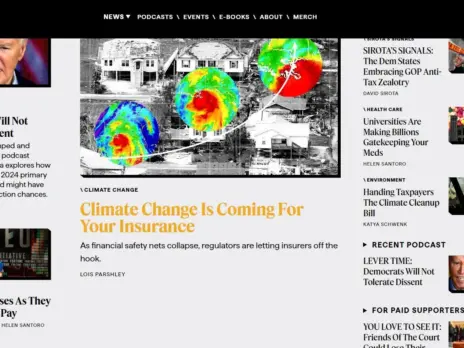
The coronavirus crisis has seen a resurgence in people turning to TV for their news, temporarily bucking the trend of longer-term decline in the face of online news sources.
People have been increasingly turning to trusted news sources during the pandemic, with TV viewing figures booming – along with traffic to news websites – as viewers tune in for the latest updates on the virus.
In the UK, just over half (55%) of respondents to this year’s Digital News Report said they used TV as a source of news in January, compared to more than three-quarters (77%) for online, including social media.
Both these figures rose in April, when the survey was carried out again, under lockdown, with TV climbing to 71% and online up slightly to 79%.
The Reuters Institute for the Study of Journalism carried out its main survey of 40 countries in January/February, with sample sizes of about 2,000 adults each, for the annual report.
Then in April it carried out a separate survey to understand the impact of the pandemic on media consumption, covering just six nations: UK, USA, Germany, Spain, Argentina and South Korea, with sample sizes of about 2,000 for the UK and Germany and about 1,000 for the others.
Among the under-35s surveyed in April, more than half (57%) said they had used TV as a source of news in the last week – a rise of 25 percentage points on January – compared to 61% for social media, up 9%.
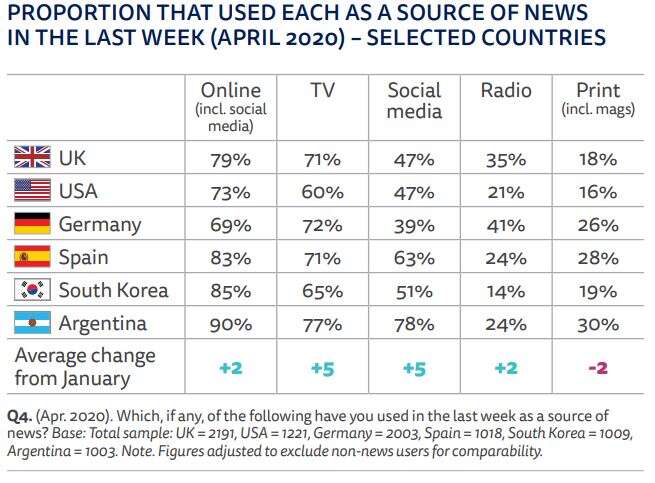
‘Trust halo’ may be short-lived
The report said: “Overall our April 2020 survey found the news media were considered to have done a good job in helping ordinary people understand the extent of the crisis (60%), and also in making clear what people can do personally to mitigate the impact (65%).”
Across the six countries surveyed for the report in April, 59% of respondents rated news organisations as trustworthy on Covid-19, on a par with national governments and behind scientists, doctors, and health organisations.
By contrast, just 26% said the same of social media and 24% of messaging apps, which both ranked lowest on trust.
In the six countries surveyed in April, more than four-in-ten (43%) accessed both social media for news and traditional media sources on a weekly basis, however.
The report said the parity between national governments and news organisations on trust perhaps reflected the way that media organisations “focused on amplifying government messages about health and social distancing” in the early stages of the crisis.
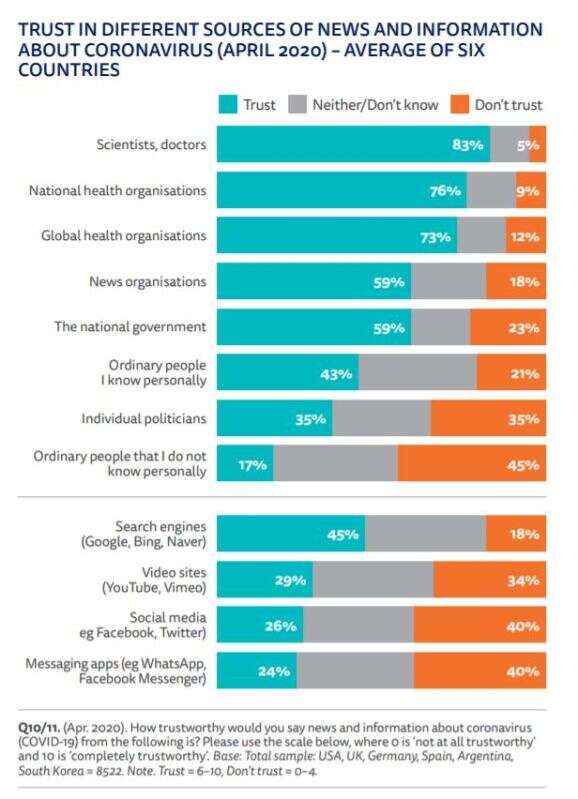
“As things return to normal, the media are likely to become more critical of government and this may in turn lead to a return of more partisan approaches to media trust,” it said.
“Consensus has already started to break down as normal activities resume and disagreements resurface about the best way to manage the recovery. Any ‘trust halo’ for the media may… be short-lived.”
But as the coronavirus broke out, the report said overall levels of trust in the news globally (across 40 countries) were at the lowest point since it had begun to track the data, with 38% saying they trust news overall.
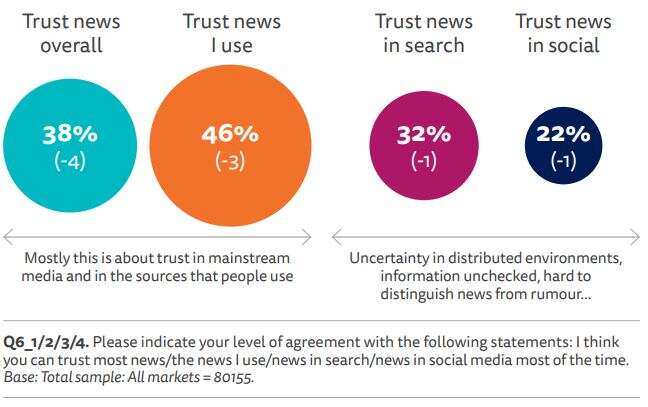
In the UK alone this fell to 28%. The authors offered the explanation that “divided societies seem to trust the media less”, perhaps because news outlets “carry more views that people disagree with”.
In the last five years Britain has faced the Brexit vote and what the report described as a “toxic political campaign” in December 2019 that returned Boris Johnson and the Conservatives to power.
Splitting the UK sample of more than 2,000 adults by political leaning, only 15% of those on the left agreed with the statement: “I think you can
trust most news most of the time,” compared with 36% for the right.
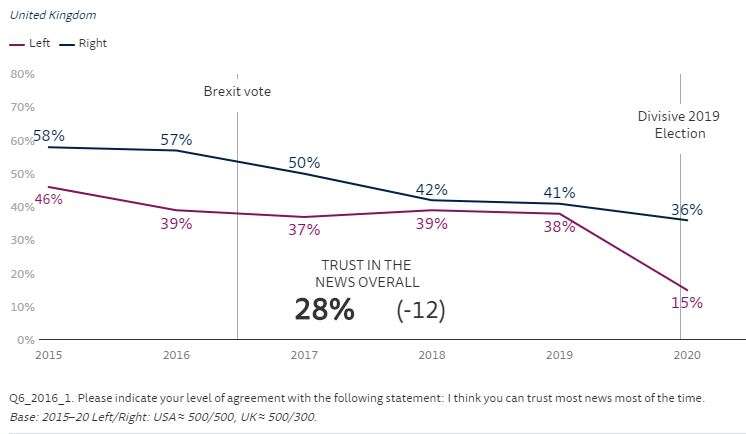
Misinformation fears
The report said the seriousness of the Covid-19 crisis had “reinforced the need for reliable, accurate journalism”, but had “also reminded us how
open we have become to conspiracies and misinformation”.
More than half (56%) of those surveyed overall remain concerned about what is real and fake on the internet when it comes to news. In the UK, the figure was 63%, down seven percentage points on the year before.
Brazil was highest at 84% and Netherlands lowest at 32% of people who agreed with the statement: “Thinking about online news, I am concerned about what is real and what is fake on the internet.”
Twice as many people are concerned about social media (40%) as a source of misinformation compared with news websites (20%).
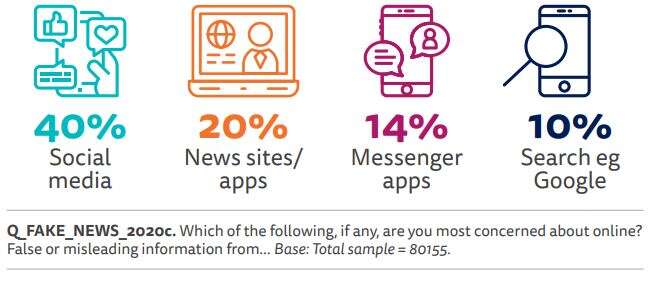
During the coronavirus crisis, conspiracy theories linking the virus to 5G networks and claiming it was developed in a Chinese military research facility were shared on social media.
Press Gazette has highlighted some of these as part of our Fight the Infodemic campaign, which launched earlier this month.
In the Digital News Report’s April survey, 37% of respondents said they had come across a lot or a great deal of misinformation about Covid-19 on social media and 32% said the same of messaging apps, like Whatsapp.
Domestic politicians are seen as most responsible (40%) for false and misleading information online, followed by political activists (14%), journalists (13%), ordinary people (13%), and foreign governments (10%).
Growth of paid content and donations
In the past year, more publishers have begun charging for online content. Although, the proportion of paywalled news titles in the UK remains small, with just 7% of 2,000 respondents saying they had paid for online news or accessed a paid-for online news service in the last year.
In the UK, 39% of respondents said they had access to The Times and 20% to The Telegraph, although this could include free trials.
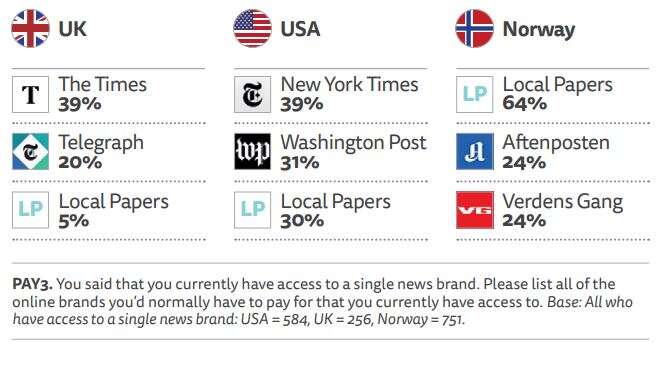
While there has been concern over the “walled garden” of news that might exclude people on lower incomes, only 9% of UK respondents said they were concerned others would miss out on news from sources behind paywalls, compared with 24% in the US.
The report said: “Lower concern in the United Kingdom may be because of widespread availability of high-quality free news from the BBC News website, many widely read popular newspapers and digital-born titles, and titles like the Guardian, with its open donation model.”
The report revealed that The Guardian receives 42% of donations to newspapers in the UK, although most are one-off and average less than £15.
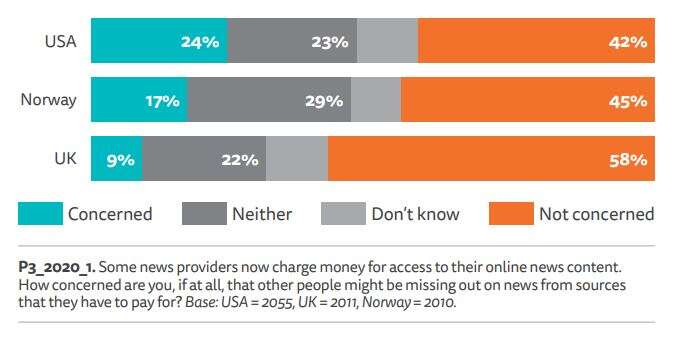
Quarter would miss local papers ‘a lot’
In the UK, a quarter (25%) of respondents said they would miss their local newspaper or news website “a lot” if it went out of business, compared with 39% in the US and 54% in Germany, where regional dailies are prized.
Said the report: “The value placed on local news seems to be partly related to the importance that countries place on their regions more generally – and the extent to which local politics matters.”
News with no political view preferred by most
Across all nine countries, the majority in each country say they prefer news with “no particular point of view”, the report found.
In the UK, 76% of respondents say they prefer news with “no point of view”, with just 13% for news that shares their point of view and 11% for those that challenge their point of view.
In the UK alone, a preference for news with no point of view is seen across TV news, social media and print newspapers.
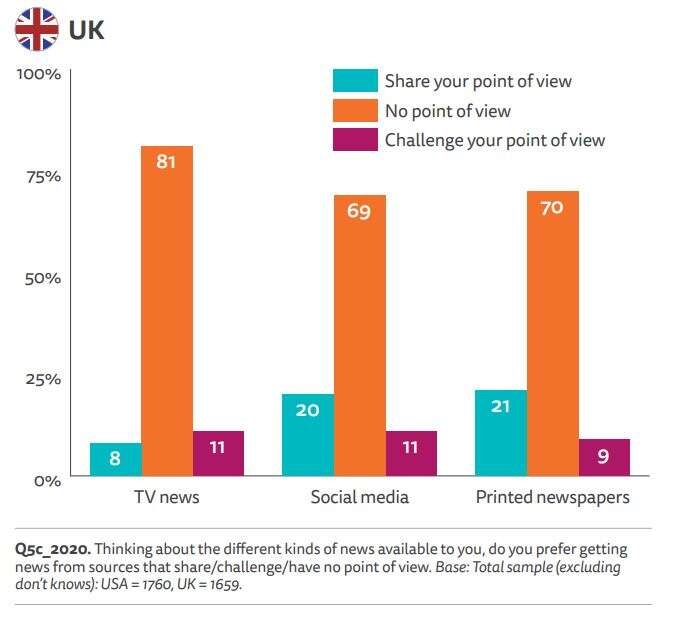
By way of explanation, the report said: “Greater political polarisation has coincided with an explosion of low-cost internet publishing which in turn has led to the widespread availability of partisan opinions online.
“With news coverage increasingly commoditised, parts of the traditional
media have also focused more on strong and distinctive opinion as a way of attracting and retaining audiences.
“Some commentators have increasingly questioned the value of objective news in a world where people have ready access to news from so many different points of view, while others worry that social media and algorithms are encouraging echo-chambers and pushing communities apart.”
Smartphone usage continues to climb
Over two-thirds (69%) of people now use a smartphone for news on a weekly basis, the report found.
In the UK, smartphone use has climbed over the past seven years to become the dominant device to access news, overtaking desktop, with 62% of those surveyed saying they had used it for news in the last week.
Out of six countries, only Spain is higher at 72%. The US is at 58%.
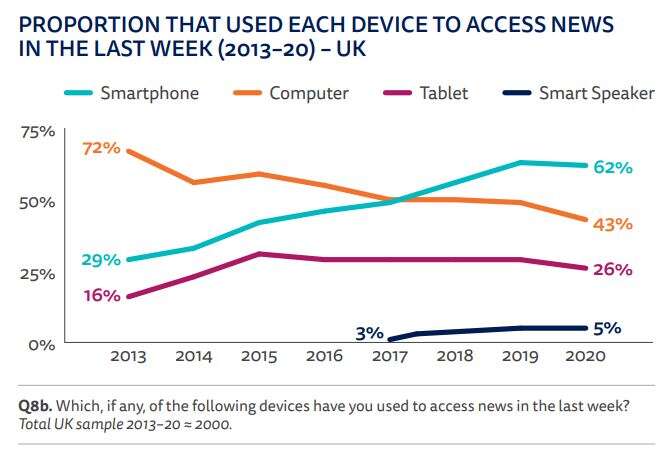
Smart-speaker use for news continues to rise since they first appeared commercially in 2017. The survey found 19% of respondents now use them in the UK (not only for news), more than any other country.
News outlets have begun to develop bulletins and briefings for the medium.
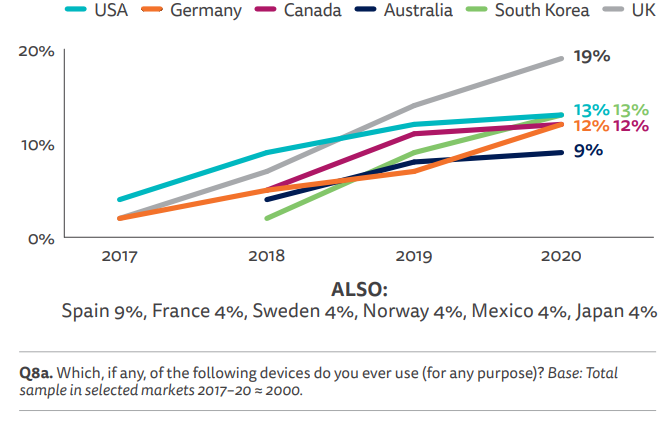
Chart shows proportion that use smart speakers for any purpose
Next 12 months ‘critical’ for future of news
The report said: “The Covid-19 crisis has clearly demonstrated the value of reliable trusted news to the public but also to policymakers, technology companies, and others who could potentially act to support independent news media.
“The creativity of journalists has also come to the fore in finding flexible ways to produce the news under extremely difficult circumstances.
“Fact-checking has become even more central to newsroom operations, boosting digital literacy more widely and helping to counter the many conspiracy theories swirling on social media and elsewhere.
“Publishers have also found innovative ways to display and interrogate data, just one of many format innovations that have helped audiences understand the background and the implications for each individual.
“The next 12 months will be critical in shaping the future of the news industry. Many news organisations go into this period clearer than ever about the value of their product even if the immediate outlook looks uncertain.”
Email pged@pressgazette.co.uk to point out mistakes, provide story tips or send in a letter for publication on our "Letters Page" blog



